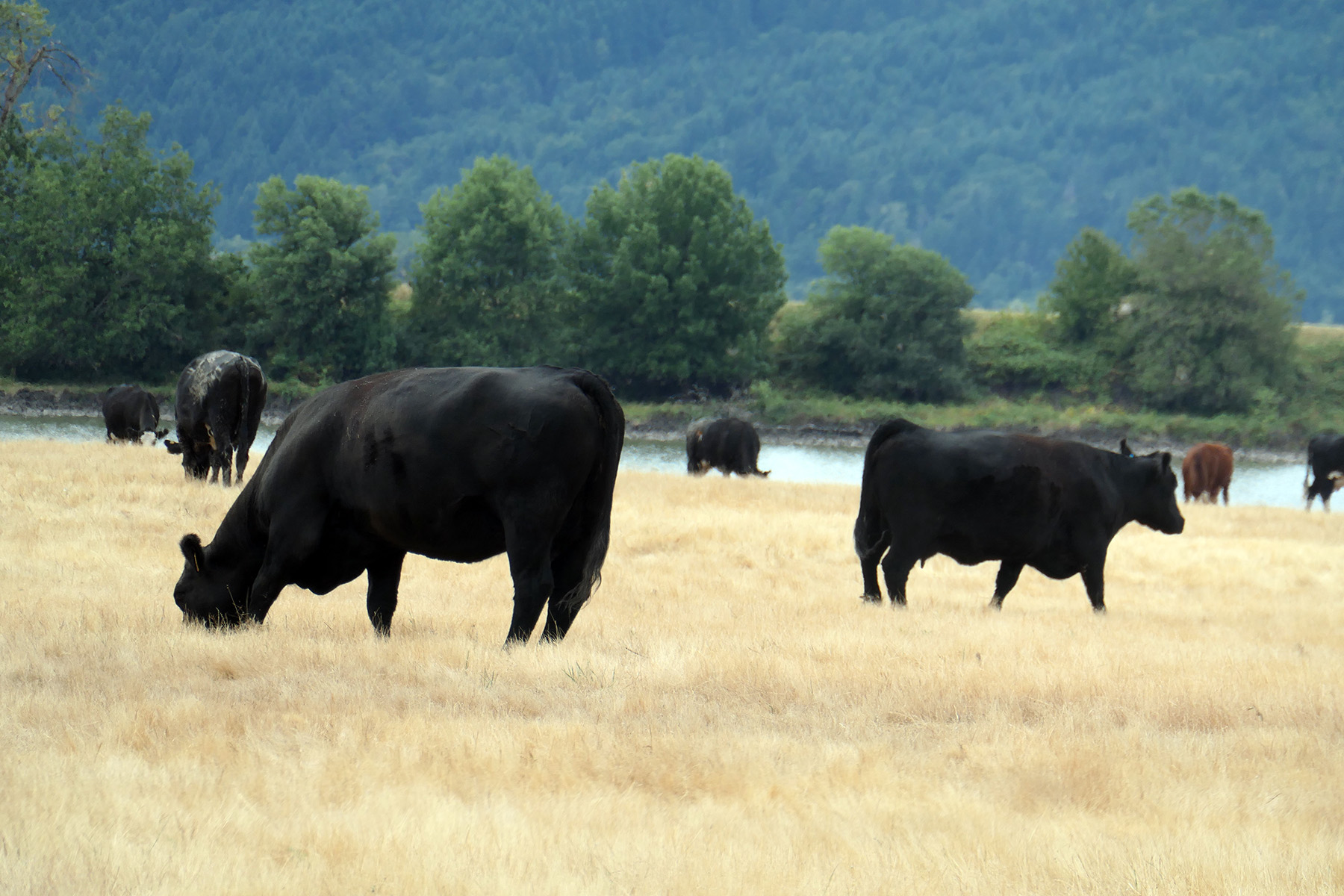What comes to mind when you look at today’s photographs? Bucolic scene? Oregon Pastoral? A lazy summer afternoon? A longing for the country side?

Would your thoughts change if I told you I had to walk through the herd of cows because they left their wide open pastures to seek shade under the tree canopy of the hiking path during this untimely heat? (Luckily I have bovine affinities, and did not mind moving slowly among them, although the thought crossed my mind that here I was all alone in the middle of nowhere, borscht if something should happen.)

Would you look at the photos again with different eyes after you’d read the latest reports on cows’ interactions with the environment beyond crowding solitary hikers? If you learned that meat and dairy production emit more greenhouse gas than entire nations, Germany and France, for example?
That air pollution from farms leads to 17,900 U.S. deaths per year, most coming from people living downwind at near distances? Would it make you feel less positive about these grazing gentle giants?

Or would it make you feel sorry for them if you realized that exposure to hazardous smoke like we’ve seen all summer decreases their milk production and makes them much more susceptible to disease and even death? Astonished when you read that scientists have successfully trained calves to use a latrine (major implications for climate worries, if their excrements no longer foul ground and air.)
Fooled you – today is not so much about the appreciation of cows – or lack thereof – but instead about water. Which is, in many ways, related to raising life stock.

Take the Colorado River, for example. About 40 million Americans depend on the water from this river, some in locations as distant as Phoenix, Denver, Los Angeles and San Diego. A lot of it is used to irrigste farms for both vegetables and alfalfa for cattle feed. In 1922 seven different constituents (AZ, CA, CO, NM, NV, UT and WY) agreed to a legal compact as to how the water should be divided up. Never mind that they overestimated how much water there was to begin with, or failed to specify what to do in case of serious drought. The division was proportional, depending on who had come first – even if late comers developed cities with many more users than had been the case 100 years ago.
Senior water rights trump everything else, with the amendment that if you don’t use all your water one year, the next year’s allotment might be adjusted downward for lessened need. That leads to farmers actually throwing out unneeded water, because they do not want to risk smaller future quotas. Some states have decided to tap water levels by essentially drilling tunnels into the bottom of Lake Mead, sucking out water before it gets to anyone else. Now the water is running out and no-one can agree to how much they’re willing to give up, clinging to a set of laws established a century ago.

There would be one simple solution to delay the huge problems with water shortage. If every American family would stop eating meat just one day a week it would translate to a savings of water equivalent to the entire flow of the river, saving the water now used to grow cattle feed. Meatless Mondays has indeed been installed by organization as well as individuals as one step we can all take. NYC, for example, has meatless Mondays in citywide public schools; so do many administrations across the country, hospitals included. Church Councils are advocating for it as well, arguing that it not only saves 100 billion gallons of waters, but also 70 million dollars of gas for transporting feed and cattle, 3 million acres land no longer razed for grading, and 33 tons of antibiotics used to treat sick cows no longer put into circulation. Those are large numbers for a small sacrifice.
Of course it is not just the Colorado River that is endangered. Closer to home, we have near catastrophic conditions going on in the Klamath River due to the Climate Crisis. Here is a thoughtful report on what is at stake.

Drought condition are not the only danger to our water supplies. Counter-intuitively the same is true when there is severe flooding, last seen with Hurricane Ida. As of last week, 51 water systems across Louisiana, each serving between 25 to 20,000 people, remain shut down due to Ida. Another 242 remain under boil water advisories. Around 642,000 people remain without access to clean water, according to the Louisiana Department of Health. The storm ripped power lines that provide the electricity to pump and run treatment facilities. Many of those facilities never acquired the legally required back-up generators in case of electricity outage. The problem with those, though, is that they use gas, but the storm has led to fuel shortages and flooded roads and freeways that would allow supplies to be shipped in. Last but not least the storm has ripped up the system of water pipelines, so even if you had treated water you could not get it safely to consumers.
Can’t help in this case but think of Coleridge’s poem The Rime of the Ancient Mariner’: “Water, water everywhere and not a drop to drink…”
We need change. We need rebels who push harder for tackling the oncoming climate disasters.

Music about the Colorado River today by the incomparable folk singer Katie Lee who was an environmental activist until age 95 or so – if you click on the first track it takes you automatically through all of them.






Sara Lee Silberman
Another great, interesting, timely posting, and wonderful photos! Good of you to share the shade with those cows, and glad they didn’t have you in mind for borsht….